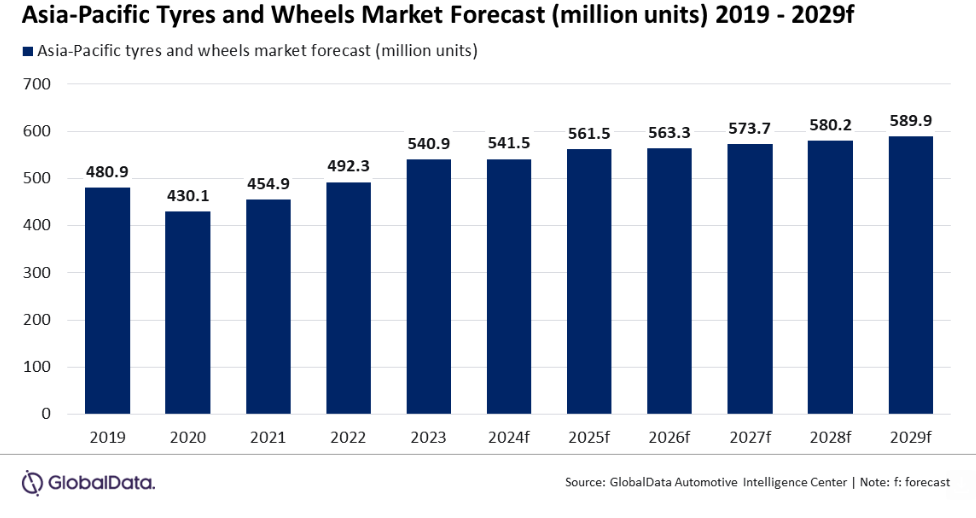Due to the increasing number of vehicles produced, constant technological advancements and innovations, the market volume for tyres and wheels has grown significantly over the years. However, as the innovations made tyres sturdier and reduced the occurrence of flat tyre scenarios, the demand for spare wheels has decreased, negatively impacting the sector and lowering the overall market growth. Against this backdrop, the tyres and wheels market in the region is expected to post a compound annual growth rate (CAGR) of 1.7% over 2024–29, according to GlobalData, a leading data and analytics company.

GlobalData’s latest report, “Global Sector Overview & Forecast: Tyres and Wheels – Q2 2024” reveals that the tyres and wheels market in APAC is estimated at 541.5 million units in 2024 and is expected to reach 589.9 million units in 2029.
Madhuchhanda Palit, Automotive Analyst at GlobalData, comments: “Sensors are now being attached to tyres to extend their lifespan and enhance road safety by monitoring their condition. These tyre monitoring sensors are still in the early stages of development, but once installed, they collect data on tyre performance, including parameters like pressure, temperature, and tread condition. Such data can be utilized to enhance safety on the roads. Additionally, in response to global concerns about emissions standards, manufacturers are focusing on innovations to reduce the weight of wheels to reduce fuel consumption and consequently reduce exhaust emissions.”
The automotive industry’s rapid adoption of modern technologies, particularly electric and autonomous vehicles, is driving innovation in the tyres and wheel sector. To meet the unique needs of these vehicles, tyre manufacturers are developing new technologies, such as roll-resistance tyre treads, to reduce rolling resistance and enhance energy efficiency for both internal combustion engines (ICE) and electric vehicles.
Palit adds: “This innovation is especially critical for electric vehicles (EVs) due to their heavier weight and the ongoing focus on improving battery range. Additionally, AV tyre health monitoring is an innovation which has been tailored to meet the specific requirements of autonomous vehicles, marking a significant acceleration in innovation for this sector.”
Prominent industry participants are directing their efforts towards developing tyres aligned with emerging automotive technologies. Bridgestone, for instance, has affirmed that all its newly manufactured tyres spanning its complete product range will be compatible with electric vehicles. Similarly, companies like Hankook, Kumho Tire, and Nexen Tire have disclosed plans to establish new tyre production facilities adept at catering to electric vehicles.
Palit concludes: “The advancements and developments in the automotive industry are significantly influencing the dynamics of the tyres and wheels sector. In addition to improving performance, manufacturers are now also required to prioritize reducing wheel weight to mitigate exhaust emissions and limit air pollution resulting from tyre wear and tear through innovative solutions. Furthermore, manufacturers are investing in upgrading their factories to produce tyres and wheels that meet the specific demands of the rapidly expanding EV market.”